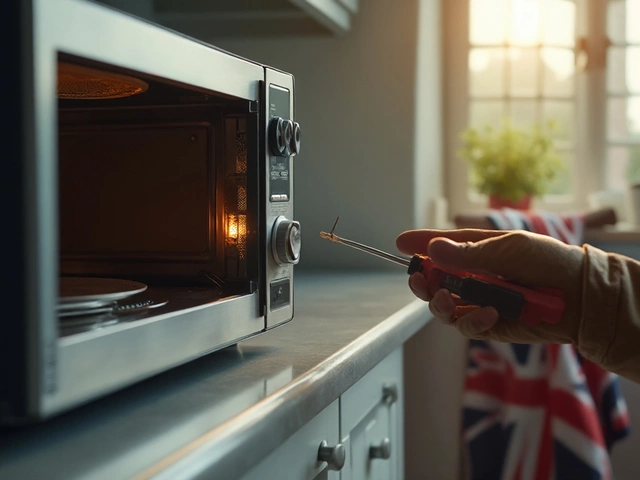Got a washing machine that won’t spin or an oven that stays cold? Before you dial a repair service, grab a pen and follow these simple checks. Most household appliances give clear clues when something’s wrong, and a quick test can save you time and money.
Start with the power supply. Unplug the unit, wait a minute, then plug it back in. If the display or lights don’t come on, check the fuse or circuit breaker. A tripped breaker is an easy fix.
Next, listen for unusual noises. A humming fridge that’s still warm often means the compressor is struggling. Give the back of the fridge a gentle shake – if it rattles, the compressor may need a professional look.
For ovens, the most common symptom is uneven heating. Run a simple thermometer test: place an oven‑safe thermometer in the middle, heat to 180 °C, and compare the reading after ten minutes. A difference of more than 20 °C points to a faulty element or thermostat.
Dishwashers that won’t drain usually have a blocked pump or a kinked hose. Remove the bottom panel, locate the pump, and check for debris. A quick clean often restores flow.
Heat pumps that stop blowing warm air can be traced to a clogged filter or low refrigerant. Locate the filter (often behind a front grille), clean it with a vacuum, and see if airflow improves.
If you’ve checked power, filtered the air, and cleared obvious blockages but the problem persists, it’s time to bring in an expert. Electrical faults, gas leaks in boilers, or sealed‑system refrigerant issues require specialised tools and certifications.
Also, any sign of water leakage around a water heater, boiler or washing machine should be handled quickly to avoid damage. A professional can locate the source, replace seals, or recommend a replacement if the unit is near the end of its lifespan.
Lastly, don’t ignore recurring faults. If a fridge has needed a new thermostat twice in three years, the underlying issue may be a failing compressor, which is not a DIY job.
By running these quick checks, you’ll know whether a simple fix is enough or if a qualified technician is required. It saves you from unnecessary calls and gives you confidence that your appliances stay in good shape.
Remember, regular maintenance—like cleaning filters, checking hoses and flushing water heaters—keeps most problems from surfacing. A little routine care now stops a big repair later.
Feel free to explore our other guides on specific appliances: heat pump lifespan, oven element replacement, or how to flush a water heater. Each article walks you through step‑by‑step fixes, so you can handle most issues without a fuss.
Got a question that isn’t covered here? Drop a comment, and we’ll add a quick troubleshooting tip. Happy diagnosing!

Find out how to tell if your oven’s heating element or thermostat is busted with simple tests, warning signs, and expert tips you can trust.

Learn fast how to spot a blown microwave fuse, test it safely, and replace it yourself. Step‑by‑step instructions, tools needed, and common pitfalls covered.

Struggling with a kitchen extractor fan that's lost its power? This guide explains how to find and fix common blockages that cause bad smells and poor airflow. Learn step-by-step how to safely clean your fan and make it work like new, plus get handy maintenance tips to stop future clogs. We break down the process so you don't need tools or special skills. Get your kitchen back to normal without calling in an expert.

Not sure how to keep your extractor fan running smoothly? This guide breaks down the simple steps to service an extractor fan, covering cleaning, inspecting parts, and spotting potential issues. Regular maintenance can extend the life of your fan and ensure your kitchen stays fresh and ventilated. Discover some handy tips and tricks to make this an easy task. No need to call in a professional; you can handle this yourself with a little guidance.

Curious which washing machine brand stands up best to repairs and everyday wear? This article digs into brand reliability, repair costs, and little-known tips every washing machine owner should know before buying or fixing one. You'll get the real scoop on which brands are easiest to fix, which have the cheapest parts, and what actually ends up causing most breakdowns. Whether you've had bad luck with machines before or just want a smooth laundry routine, this guide breaks it all down. No bias, just straight talk based on what actually happens when these things break.

Wondering whether plumbers can fix your boiler? This article breaks down exactly what plumbers do, where their work overlaps with heating engineers, and when you need a specialist. You’ll get practical advice for dealing with boiler issues, tips for finding the right tradesperson, and a look at why gas safety credentials matter so much. There’s even a checklist for what to ask before hiring someone for your boiler job. Skip the confusion and figure out who to call, fast.